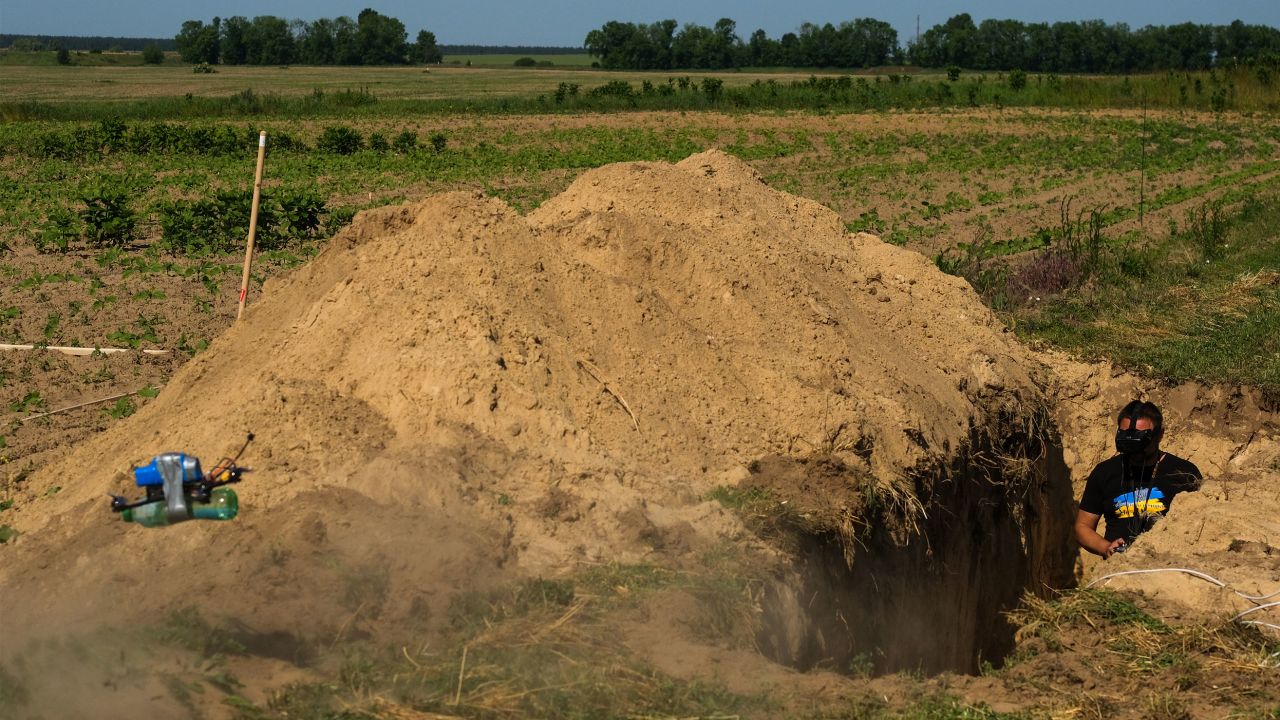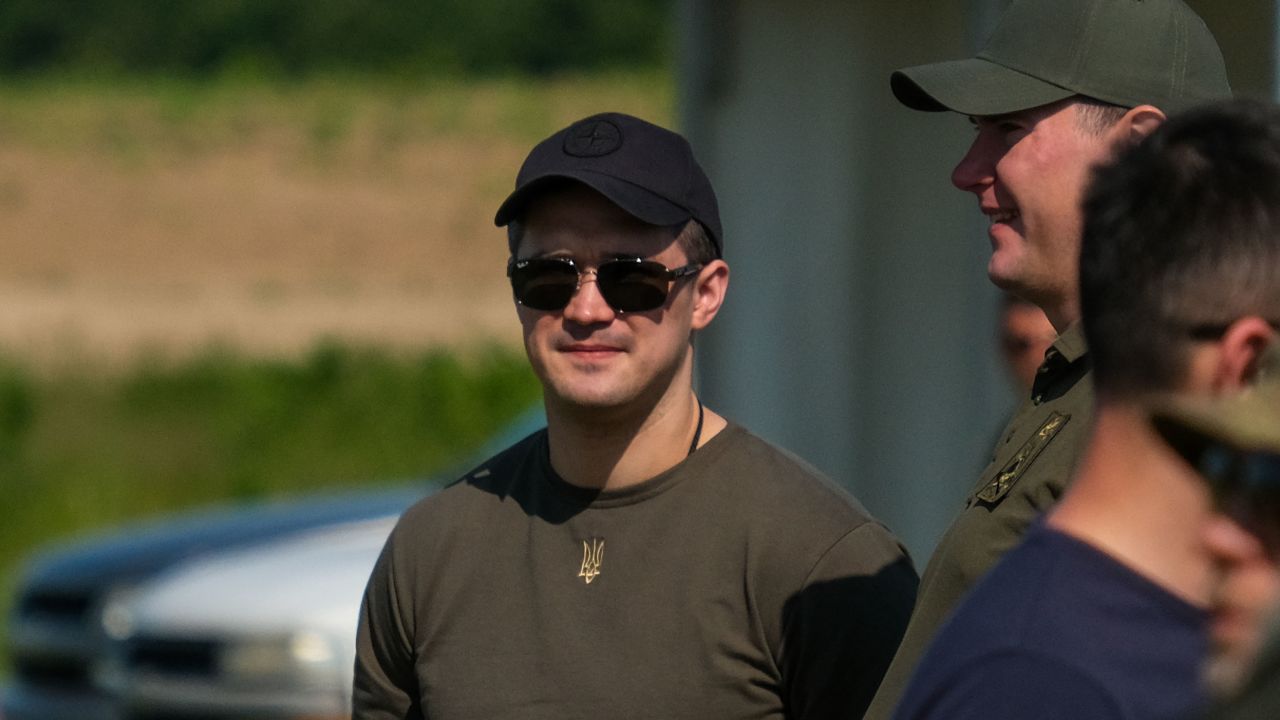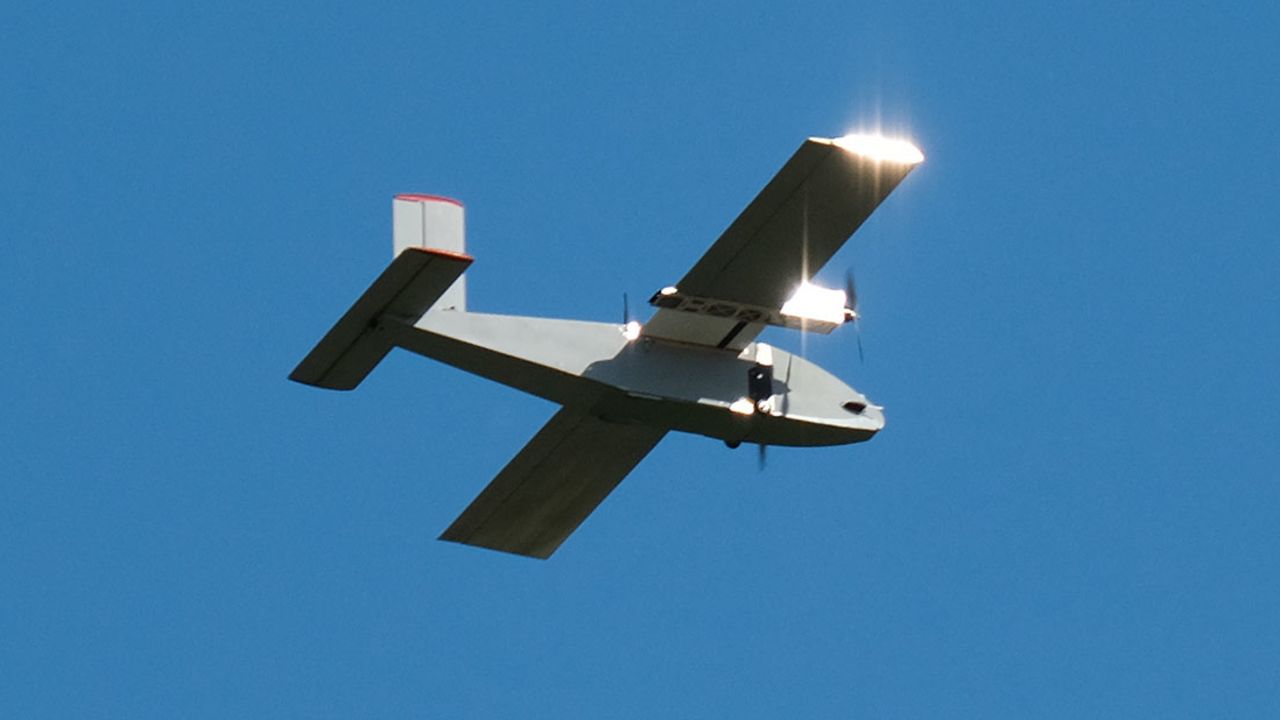CNN
—
Under the scorching summer sun at an undisclosed location in Ukraine, an almost invisible drone approaches in the distance. Difficult to spot, the remote-controlled aircraft is also nearly impossible to hear.
“It’s very stealthy,” drone maker Valeriy Borovyk says. “We call this one Vidsyich (Ukrainian word for ‘repel’).”
The Vidsyich is what Borovyk calls a combat drone, designed to attack Russian positions.
Borovyk is one of dozens of drone developers that have sprung up all over Ukraine. A first wave appeared when Russia first occupied Crimea and parts of the Donbas in 2014, and another eight years later when Moscow launched its full-scale invasion.
Unmanned aerial vehicles (UAV) were first deployed to help artillery locate Russian targets and now, many believe they are being used to hit targets well inside Russian territory.
Borovyk says he and his team developed the Vidsyich for use in combination with other surveillance drones they have also built.
“It has a range of 40 kilometers and can carry a warhead of two to three kilograms,” he says. “We mostly concentrate [our attacks] on very expensive [Russian] equipment.”
Borovyk says his company is in the process of upscaling its production after signing a deal with a factory in Ukraine, which would increase production from 50 drones per month to over 1,000. And they have several models, of all shapes and sizes.
His operation is just one small part of an industry built on Ukrainian ingenuity and survival instinct, which the country’s government and military are keen to support.
Ukrainian and foreign UAV makers rock up early at an open field in the outskirts of Kyiv, to take part in a drone competition organized by the Ministry of Digital Transformation.
“Today we are looking at FPV (First Person View) drone developers,” Deputy Prime Minister and Minister for Digital Transformation Mykhailo Fedorov says, before surveying the developers.
“Every few weeks, we conduct various studies, see what is happening in this direction, look for new drone developers, study the results,” Fedorov explains. “It is very important for us to find companies that can scale, to look at new usage formats, because this is a technological war.”
The event puts drone-makers to the test, forcing their creations to demonstrate their capabilities in attacking ground targets, chasing fixed-wing drones and even drone dog fights. It attracts the sort of crowd you would expect to see at a gaming or tech convention: geeky, alternative and mostly way too young to have any combat experience.
But age is but a number, especially when it comes to patriotism. When Russia invaded, Ukraine had fewer tanks, planes, and missiles, but drones are cheap and relatively easy to produce – all qualities that Fedorov says have helped the aircraft become a “game changer” for the country’s war effort.

“FPF drones are becoming more and more relevant on the front line because it’s an opportunity to do a targeted strike, helping narrow the focus of artillery,” he explains. “So we need tens of thousands of FPV drones every month.”
It’s part of a government initiative called “Army of Drones” which has relaxed import restrictions and taxes for drone technology, spurring the development of a local industry to better supply the country’s military. And many of the makers at the event are keen to take part, open to adapting their creations to military needs as they hope to secure Ukrainian government support in order to upscale production.
“Our drone has proven very effective, because it is quickly disassembled and you can work immediately after 5 minutes,” Denis Sega, one of the operators at the event says. “You can quickly leave the area of work to save the lives of our pilots.”
Sega says drones were a hobby before the war, then they became indispensable. “They are very easy to use, especially if the pilot has flown similar drones,” he adds. “I think [pilots] will intuitively understand how to work with them.”
That’s in part what the Ukrainian military is looking for but the man in charge of drone procurement for the Ukrainian military, Brig. Gen. Yuriy Shchyhol, says drones have changed warfare and claims Kyiv can put all types of UAVs to use.
“Each type of drone has a completely different application,” says Shchyhol, the head of the country’s State Service of Special Communications. “Both cheap and expensive drones are needed. And drones with different types of communication. The more models we have, the more communication channels we have, the more efficient our work will be.”
Shchyhol says the ultimate goal is mass production. “Around 30 companies in Ukraine are already mass-producing these drones, and our goal is to purchase up to 200,000 by the end of the year,” he said. “So far we have signed contracts for the purchase of 2,000, and this is only for a few weeks. Every week, this process is scaled up.”
Quantity and versatility is key – especially as Ukraine expands the scope of its drone program as well as their usage on the battlefield.

When the Moscow region was targeted by drones on Tuesday, the Kremlin was quick to blame Ukraine. But exactly who launched the UAVs, what type they were and from where they were launched remains something of a mystery.
Recent attacks on Russian oil refineries and other targets suggest that Ukraine is developing models that can penetrate deeper into Russian territory, but with limited payloads.
Images of the drones flying towards Moscow Tuesday, and the fragments purportedly photographed on the ground, are far from conclusive. But one model, with a distinct Vulcan wing design, appears to be similar to a drone used against a Russian oil refinery in Ilysk early in May. Ukrainian volunteers posted images purportedly showing the launch of that drone and the fire at Ilysk.
At the time, Serhiy Prytula, whose foundation has raised money for new drone programs, said on Twitter: “Remember our big crowdfunding campaign ‘For revenge’? Kamikaze UAVs with the range up to 1000 km. Well… We cannot neither confirm nor deny, but some ru oil depots have had hard times recently. Ilsky oil refinery in Kuban for example.”
Other Ukrainian drone attacks, using repurposed Soviet-era vehicles, have targeted Russian air bases, causing what appears to have been limited damage.

One longer-range Ukrainian drone is the UJ-22, made by Ukrjet and with a reported range of up to 800 kilometers (500 miles). A drone resembling the UJ-22 either crashed or was brought down about 100 km from Moscow in February. Russian authorities reported it had caused no damage.
Posting an image of the crashed drone, Ukrainian official Anton Gerashchenko said it was more than 500 km from the border, adding: “Soon Putin might get very afraid to show himself in public as drones can reach far distances.”
It’s unclear whether any UJ-22 were among the drones sent towards Moscow this week, but with a speed of only 120 km/h (75 mph) and a modest payload, it’s not going to cause massive damage.
Ukraine did not directly acknowledge carrying out the attack, but when asked whether Ukraine’s drones could reach Moscow, Fedorov said there had been some breakthroughs on that front.
“We are increasing the production of long-range drones,” he said. “I cannot comment on the details of the missions here. But in this direction, a certain revolution is also taking place regarding production scaling.”
Many of the developers at the drone competition acknowledge they are working on developing UAVs that can fly longer distances and carry larger payloads.
Some have already been successful. Borovyk is one of them.
“From 15 kilometers to 700 kilometers, depending on the warhead,” he says. “With a 20 kilogram [warhead[, we can go all the way to Moscow.”